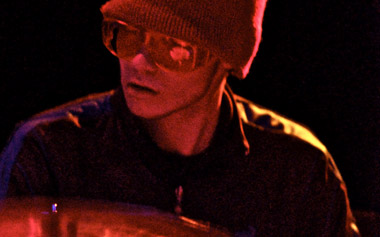Guitarist Adam Bosse’s initial idea for a band included three guitarists, two drummers, a bass player and horns. He ended up with one drummer, Eric Kenseth, period. End of story. And he’s okay with that.
In fact, both Bosse and Kenseth are fine with the arrangement: after jamming on some of Bosse’s creations, they liked what they heard, and quickly decided that they didn’t need anyone else gumming up the works. BEEK was created, and the two immediately began collaborating.
The musicians have both spent time in UMass-Amherst’s jazz program, though not together. After graduating in 2009—Kenseth’s year as an incoming freshman—Bosse decided to stay in the area, partially to keep attending UMass concerts. That’s where he saw Kenseth play, and instantly fell for his approach to the drums.
So in 2010, after compiling a handful of tunes, Bosse reached out to Kenseth and invited him to play in one of the practice rooms at the school.
“I had given him one of the rough charts I had been working on, and just told him to read along and play whatever came to mind,” Bosse says. “Right away it struck me how full we sounded playing as just the two of us. When he asked me what other instruments I had in mind for the songs, I gave him a list and his response was, ‘We should just do this as a guitar and drum duo.’
“And it was settled. From that point on we started developing the song ideas into a language that fit how we sounded together, and in a matter of a couple rehearsals, we were writing music together.”
The duo’s atmospheric and, at times, explosive music is influenced by a wide array of artists, from Radiohead, Sonic Youth and Tortoise to Duke Ellington, John Coltrane and Sun Ra.
BEEK has taken a few different approaches to songwriting, citing a need to keep things fresh and find new and exciting ways to create.
“We like to play free often, so we’ll just play and record, and see if there’s an idea somewhere in the middle we can expand upon,” Bosse explains. “But most often, we’ll come into the practice with an idea, jam on it for a bit, record it, bring it back home and see if further ideas will develop.”
He says they often generate up to a dozen different recordings of every song, each one a development from the previous take.
“We usually take time to let the ideas flesh themselves out,” he says, “and it always works out for the best.”
BEEK continually strives to strike a balance between structure and spontaneity.
“The tunes we have so far were all written with a lot of room for moments of free improvisation, so that type of freedom of spontaneity really helps shape how the song turns out,” says Bosse. “The free sections of the songs have a sort of outline, where we guide ourselves on how to approach the sections. From that point on we just let our playing guide the outcome, and often we stick to the core idea when we play it again, but a song is never really played the same way twice.”
BEEK plays Flywheel in Easthampton on Friday, June 24. For songs and more information, visit www.myspace.com/beekband.



